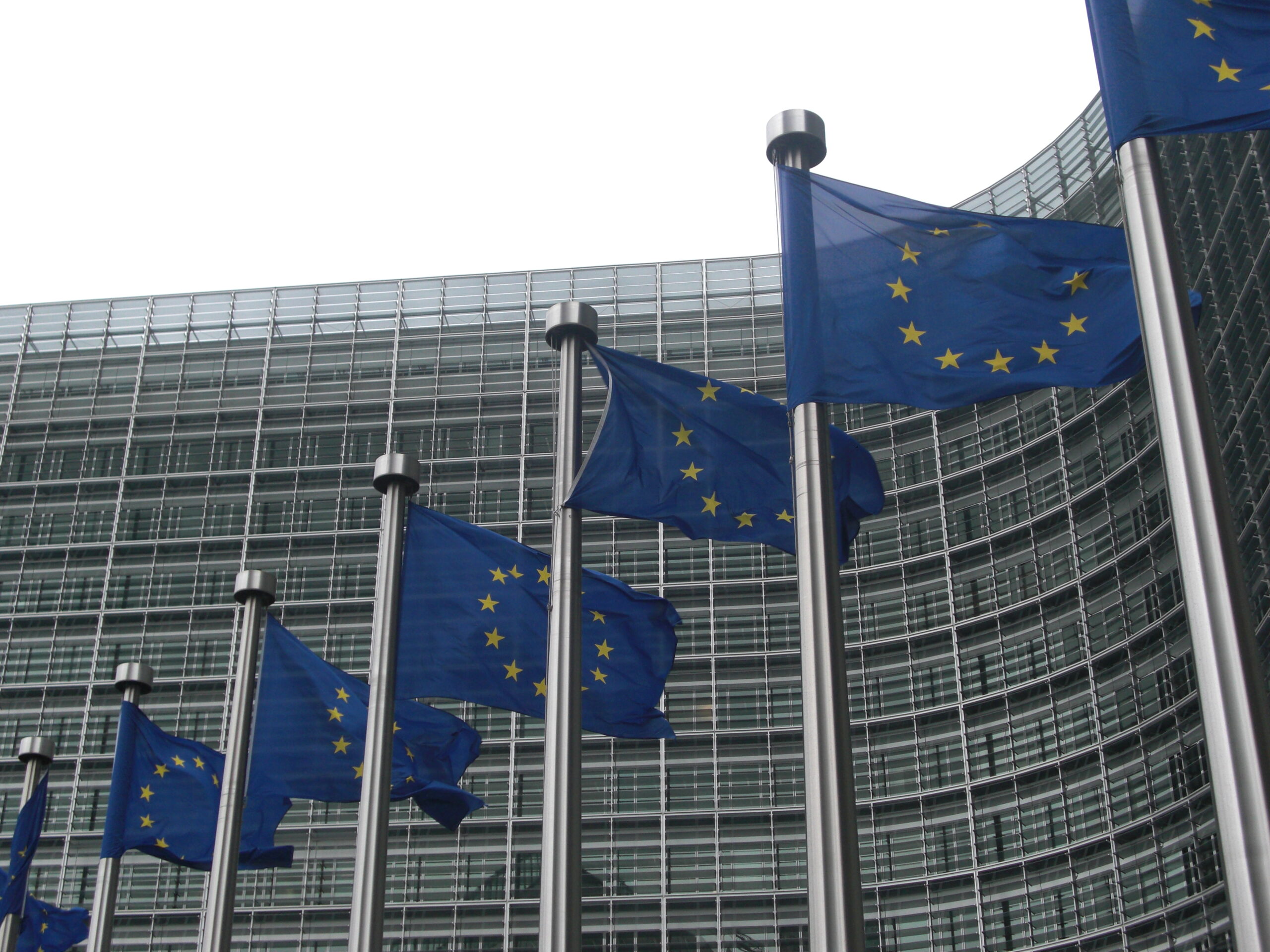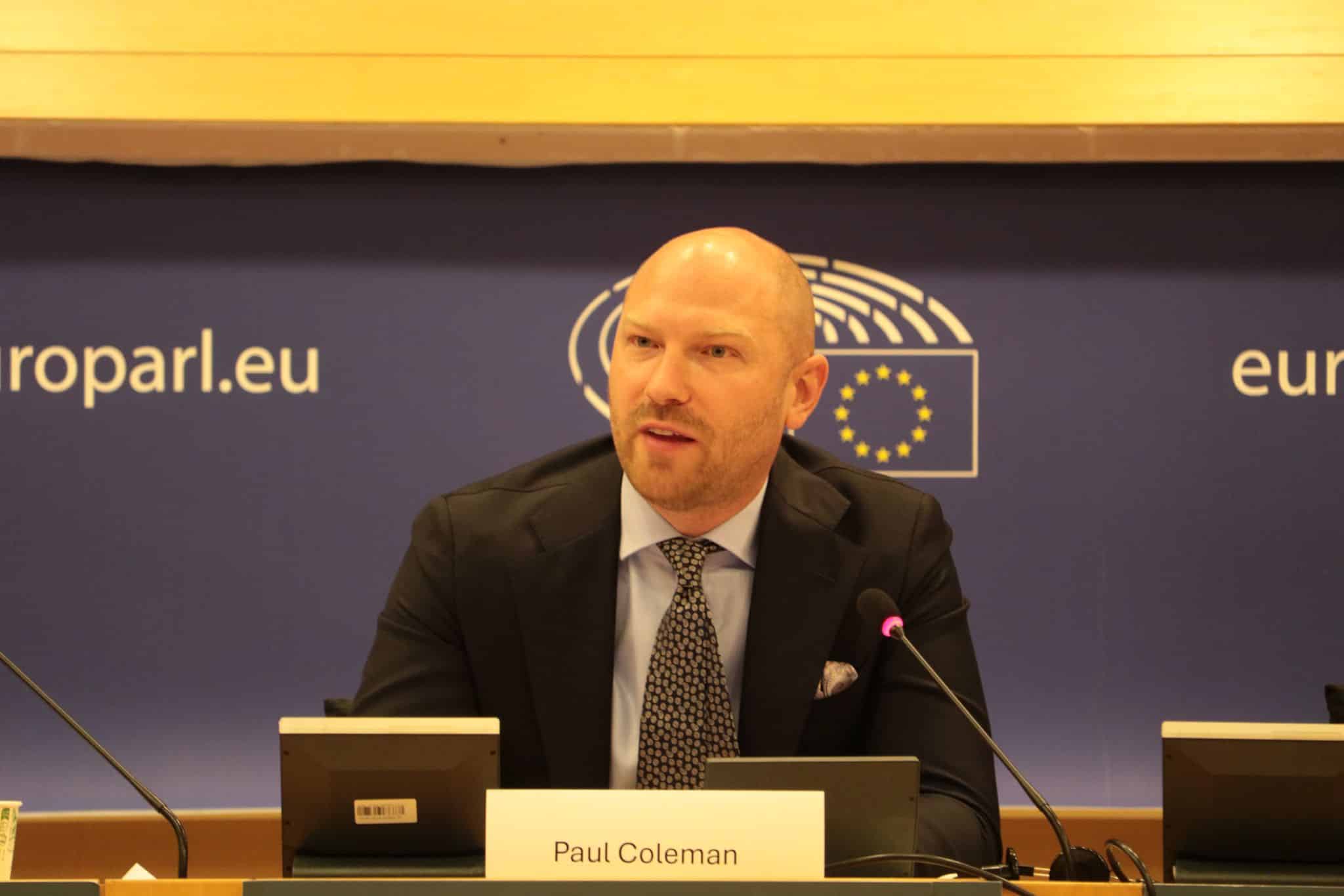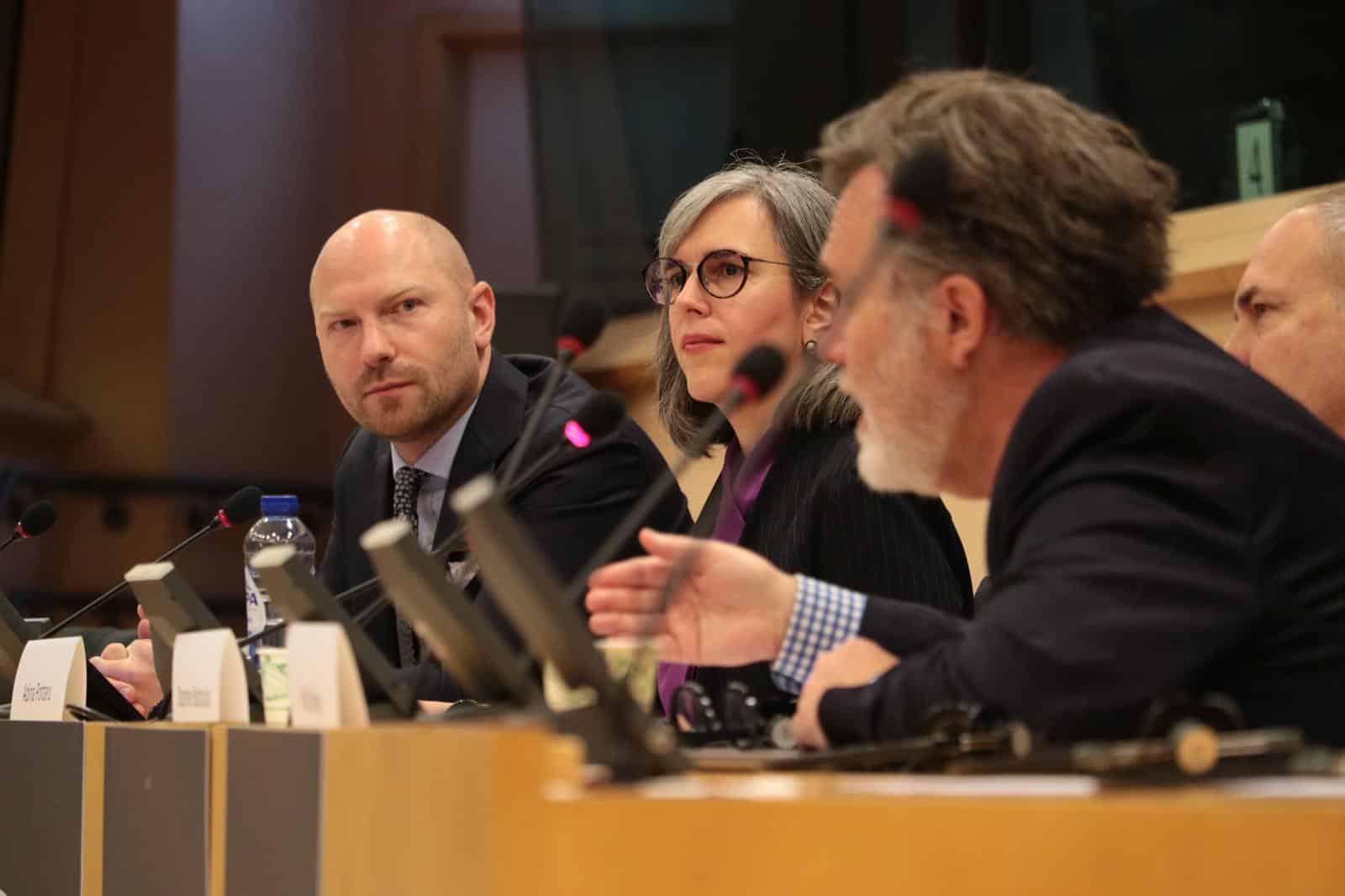Prosecution seeks conviction for quoting the Bible as Finland’s highest court hears final appeal
Continue readingOne hundred experts write to European Commission warning EU legislation risks censoring global speech
- Letter calls on Commission to consult free speech experts as part of review into censorial Digital Services Act (DSA)
- Letter from free speech experts, which was coordinated by ADF International, comes after US Ambassador to EU and Google recently expressed concerns that DSA risks censoring American online speech
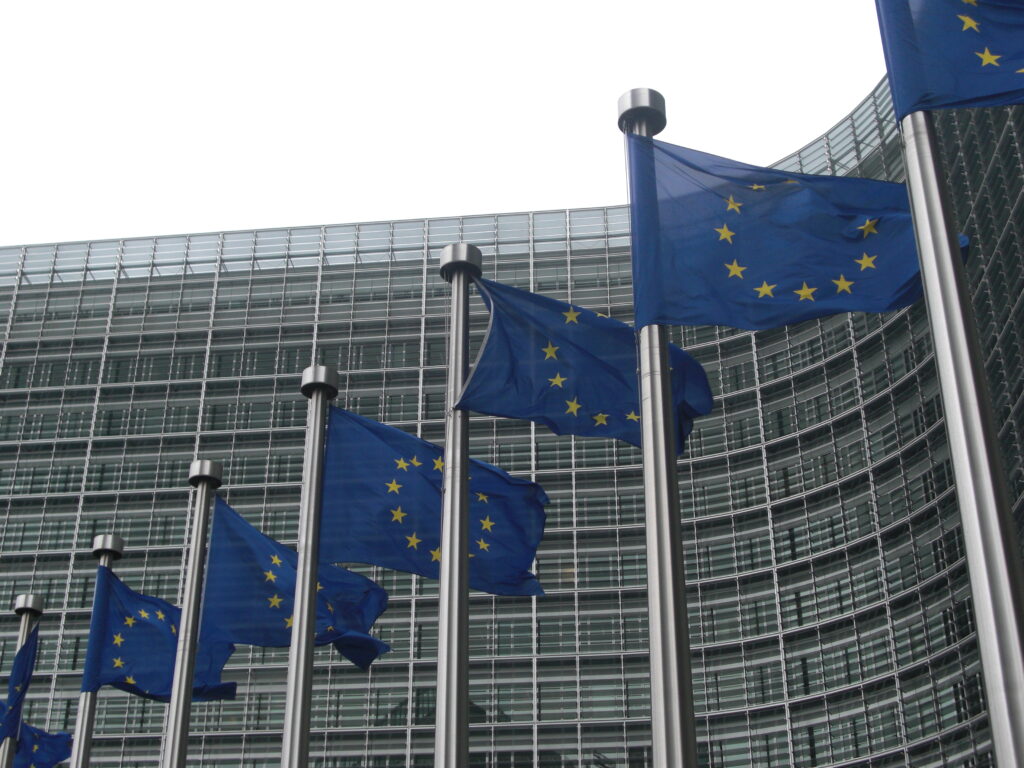
BRUSSELS (9 October 2025) – More than 100 free speech experts from around the world today wrote to the European Commission warning that an EU law risks censoring global speech online.
In a letter to the European Commission, the 113 experts, including a former VP of Yahoo Europe, a former US Senator, and politicians, academics, lawyers and journalists from around the globe, called on the Commission to consult free speech experts as part of its review into the EU’s Digital Services Act (DSA), which will take place by 17 November.
The letter, which was coordinated by free speech legal advocacy organisation ADF International, states: “[The DSA] constructs a pan-European censorship infrastructure with loosely defined boundaries and the potential to suppress legitimate democratic discourse…
“The wide definition of illegal content allows the most speech-restrictive provisions of one single EU country to be imposed as a standard across the entire Union, and potentially worldwide, effectively importing the lowest common denominator of expression.”
The letter added: “The broad definition of ‘illegal content’ in the DSA, combined with existing jurisprudence of the Court of Justice of the European Union (CJEU) opens the door to worldwide takedowns.”
Signatories include ADF International Executive Director Paul Coleman, President, CEO, and Chief Counsel of Alliance Defending Freedom Kristen Waggoner, former Vice President of Yahoo Europe Jean-Marc Potdevin, former US Senator and former US Ambassador-At-Large for International Religious Freedom Sam Brownback, Founder and General Secretary of the Free Speech Union Toby Young, former President of the American Civil Liberties Union Nadine Strossen, award-winning journalist and author Michael Shellenberger and Research Fellow at the Hoover Institution Ayaan Hirsi Ali.
Cross-party Members of the European Parliament (MEPs) also signed the letter, including ECR MEP Stephen Bartulica, EPP MEP Branko Grims, and Patriots MEP Virginie Joron, as well as McCormick Professor of Jurisprudence at Princeton University Robert P George, American philosopher and author Peter Boghossian, child protection advocate Chris Elston aka Billboard Chris and other experts from the UK, Europe, Latin America and the United States.
Read the full letter, see the full list of signatories and sign the public version of the letter here.
Opaque review process into DSA
The letter expresses concern over the European Commission’s opaque review process into the DSA and calls on the Commission to: “Conduct a comprehensive and inclusive consultation with independent experts in freedom of expression, constitutional law, and digital rights, ahead of the November review, inviting public comments.
“Publicly disclose the list of NGOs, civil society actors, and partner entities engaged in the review process, including the criteria and methodology used for their selection.
“Ensure that the review includes a rigorous legal analysis of the DSA’s compatibility with fundamental rights protections, especially under Article 11 of the Charter of Fundamental Rights of the EU, Article 10 of the ECHR, and Article 19 of the ICCPR.”
Concerns from US Ambassador to the EU
The experts’ letter to the European Commission comes after the US Ambassador to the EU Andrew Puzder last week expressed concern that the DSA risks censoring American citizens, and follows Google warning the DSA threatens American speech.
Ambassador Puzder last week said: “No President of either party, and I can tell you President Trump in particular, is going to tolerate a foreign government restricting the First Amendment fundamental free speech, free expression rights of American citizens, to an extent that the United States government can’t even regulate those rights.
“So we need to come to an understanding as to what’s happening with the Digital Services Act.”
Ambassador Puzder has also reportedly said the United States will make formal submissions under the European Commission’s review of its digital legislation.
The letter’s warning about the threat of global DSA censorship reinforces Ambassador Puzder’s and Google’s concerns.
Dr Adina Portaru, Brussels-based Senior Counsel, Europe for ADF International said:
“The European Commission claims the DSA will not censor speech and will merely create a safer online environment. In this letter, one hundred free speech experts vehemently disagree.
“The US Ambassador to the EU and Google recently expressed concern that the DSA threatens American online speech. This letter from experts reinforces these concerns and warns that the legislation threatens to impose an online censorship regime not just in the EU, but across the whole world.
“The Commission must urgently engage with these concerns in their review of the DSA, and act to ensure freedom of expression is protected online.”
French MEP and signatory of the letter Virginie Joron said:
“The French digital regulator ARCOM told me they believe the DSA allows them to censor any post anywhere in the world using the DSA. That means even an American citizen posting in Alabama could potentially have their online post taken down, even if the publication would be legal in the US.
“This already happened in 2023 after the Annecy terror attack in a playground in the South of France where a migrant from Syria stabbed four babies and toddlers. A reaction from a US citizen was taken down, as described in the report from the US Congress.”
As well as warning about the possibility of global takedown orders under the DSA, the letter also quotes the US House Judiciary Committee in highlighting another way the EU legislation risks censoring global online speech: “Because many social media platforms generally maintain one set of content moderation policies that they apply globally, restrictive censorship laws like the DSA may set de facto global censorship standards.”
Read more about the DSA here.
Images for free use in print or online in relation to this story only
(From left to right: Dr Adina Portaru, Brussels-based Senior Counsel, Europe for ADF International; French MEP Virginie Joron)
The Digital Services Act and Online Speech in Europe
Given the wide array of anti-speech laws throughout EU countries, the DSA allows the worst laws in any individual country to restrict speech across the entire bloc

Executive Director, ADF International
We are living in an unprecedented time in Western history for freedom of expression. With the fall of the Soviet Union, some made the claim that the “End of History” had arrived.
An era in which free speech would flourish in a world of liberal democracies and free markets. But it’s now clear that such hopes were sadly misplaced, and European societies are moving in an alarming direction.
Free speech is again under threat on this continent in a way it hasn’t been since the nightmare of Europe’s authoritarian regimes just a few decades ago. The internet is the frontline in this assault on free speech in Europe, particularly through the Digital Services Act, which I will come to shortly.
How We Got Here
But how did we get here? How did we get from the “End of History” and liberal democracy’s promise of free speech for all to the censorship crisis we face today?
Two words that perhaps are not often mentioned favourably in this parliament go a long way in explaining the antecedents of the current effort to control online discourse: Brexit and Trump.
As the honorary Brit at this event, I hope you will forgive me for saying the “b-word”. But all jokes aside, those two democratic votes in 2016 sent shockwaves through the political and media establishment, who then scrambled to understand what went wrong at the ballot box, and how no one saw it coming.
And rather than examining whether perhaps some of their mistaken beliefs about reality, assumptions about the citizenry, or missteps in governance may have been responsible for these seismic votes, those in power decided to blame so-called “misinformation” instead.
In other words, the people were tricked. Hundreds of millions of citizens were so prone to manipulation and brainwashing that they stupidly, wrongly, and ignorantly voted the “wrong” way. And such wrong voting must never happen again if democracy is to be saved. Hence, with no sense of irony whatsoever, the claim that democracy must be saved through censorship took hold – here in Brussels and across the Western world.
The European establishment’s response to outcomes it did not foresee or desire was stark and immediate, as new draconian anti-speech laws came into effect. Let me outline a few:
- 2016: The EU Code of Conduct against “illegal online hate speech” was announced without any discussion or debate.
- 2017: New national legislation such as the German Network Enforcement Act came into force.
- 2018: The EU launched a world first with its Code of Practice on Disinformation – targeting online platforms.
- 2019: The UN launched its Strategy and Plan of Action on Hate Speech.
- 2020: Covid-related provisions censored free speech around the world.
- 2021: The European Commission announced a plan to make so-called “hate speech” an EU-wide crime.
- 2022: In came the Digital Services Act, with most of its provisions coming into force in February 2024.
"Severe" Threat to Online Speech
Year after year, the relentless drive towards more and more speech restrictions continues – and it’s almost always under the guise of banning so-called “hate speech” and “mis- and disinformation.” These deliberately vague and subjective terms are rarely, if ever, defined in the legislation that seeks to ban them. And I am convinced that the lack of any meaningful definition is a design feature, not a bug.
And that brings me to the DSA itself – what I consider to be the most severe threat yet to free speech online. So, what precisely is so worrisome about this regulation?
The DSA purports to create “a safe online environment” by requiring very large online platforms, such as X or Meta, to remove “illegal content”.
This sounds ok so far. But when we look closer, the problems become apparent.
What, after all, is “illegal content”? Surely a law that runs to over 100 pages would define such a pivotal term in the most precise language possible?
Sadly not.
Article 3(h) gives us the circular definition that “illegal content” is anything that is not in compliance with EU law or the law of any Member State, now or at any point in the future. In other words, the DSA writes a blank cheque for censorship.
Given the wide array of anti-speech laws throughout EU countries, the DSA allows the worst laws in any individual country to restrict speech across the entire bloc.
And what happens in such a scenario?
European Commission's Power Over Regulation
Under the Act, the European Commission can impose crippling fines of up to 6% of global annual turnover on platforms that refuse to censor content – which could amount to billions of Euros.
The Commission can also restrict access to a platform within the EU or suspend its operations, showing the massive power this Act gives them over private companies. Since companies are threatened with huge fines if they do not censor enough speech, and there is no penalty whatsoever for censoring too much speech, what do we think these companies will end up doing over time?
Moreover, individuals across the EU could have their speech limited under the most draconian “hate speech” laws in any individual EU country due to the act.
The case of Finnish parliamentarian Päivi Räsänen, one of ADF International’s clients, gives a harrowing example of what censorship under the DSA could look like in practice.
Six years ago, Päivi posted a picture of a Bible verse and expressed her Christian views on sexuality on X. She was criminally prosecuted for alleged “hate speech” and has been unanimously acquitted in two trials. But the state prosecutor has appealed the case again. And shockingly, her case—in which she faces trial for posting online—is now pending before Finland’s Supreme Court.
Now, under the DSA, deeply problematic national laws restricting speech—like the “hate speech” legislation used to prosecute Päivi —could be broadly applied across the EU by this simple principle:
If it’s considered illegal in one place, it could be in every place. And I do mean every place.
The United States Weighs In
Even though the DSA is an EU regulation, since the internet is global and most speech platforms are global companies, its effects will not be confined to this continent. Vice President of the United States, JD Vance, already raised his concerns about the perilous state of freedom of expression in Europe during his Munich Security Conference speech.
Notably, the US has taken specific exception to this act, with both the US State Department and House Judiciary Committee raising concerns over it, and they have good reasons for doing so.
To name just two: Firstly, many of the companies the DSA targets, such as X and Meta, which could face massive fines for refusing to censor content, are American.
Secondly, we have already seen an example of a senior EU politician trying to use the act to censor speech in the United States.
Last summer, then-European Commissioner Thierry Breton shockingly wrote to Elon Musk ahead of his X interview with then-presidential candidate Donald Trump, warning him not to breach the DSA in the conversation.
It is conceivable that in the future we could see more efforts like this to extend EU censorship to silence speech outside Europe. All those who care about free speech should not accept a transatlantic divide on this indispensable liberty, where the US recommits to freedom of expression—as it has under the new administration—while Europe tramples on it. I want to now offer concrete recommendations on how the censorial effects of the DSA can be addressed, as people in this room are in a real position to take action.
It is thankfully the case that freedom of expression is guaranteed in Article 11 of the EU Charter, Article 10 of the European Convention on Human Rights and Article 19 of the International Covenant on Civil and Political Rights.
According to these and the jurisprudence of the ECHR, any limitations to free speech must be proportionate and necessary in a democratic society. And so, serious questions can and should be raised about whether the DSA is compatible with these binding obligations to protect freedom of expression. It is my strong view, as you may have guessed from this speech, that it is not. So, what can be done about this?
Member states could initiate an action for annulment before the Court of Justice of the European Union. Through this, the whole or parts of the DSA could be declared inapplicable, if they are deemed to infringe on the EU Charter or Treaties.
Conclusion: The DSA Has a Far-Reaching Censorial Impact
The same question, of considering whether the DSA is compatible with binding obligations to protect free speech, is key for the upcoming DSA review, in which the Commission must evaluate the act in view of other legal commitments.
It is imperative that every opportunity is taken in the review, which must occur by mid-November this year, to raise concerns about the censorial impact of the DSA.
This could be accomplished through written or oral questions to the European Commission and even by inviting Commissioner Henna Virkkunen to discuss the legislation in the European Parliament. After all, if the Commissioner is as in favour of freedom of expression as she claims to be, why would she refuse?
It is vital to include representatives of civil society, tech companies and digital rights groups in such conversations, as they can share their invaluable expertise on this important issue.
As elected representatives of your people, you are also in an excellent position to bring the public’s attention to the grave risks to free speech posed by the DSA. The truth is that every single European’s rights are jeopardized by this legislation. The more the public is aware of and speaks out about this, the more pressure the Commission will feel. And the more likely we are to defeat this law.
I want to close by emphatically stating that freedom of expression is essential for any society, and especially for democracies, to flourish. Those in positions of power turn to censorship because they don’t trust democracy.
They fear the people will choose to speak and vote in a way that they object to.
But this censorial impulse must be rejected. There is a rich history of valuing free speech on this continent. Europeans can and must draw on that tradition again today.
.
‘Surveillance and control’: Experts convene at European Parliament to warn about EU online censorship law, following US State Department expressing concern
- First-of-its-kind, cross-party event, co-hosted by politicians and ADF International, examined threats to free speech posed by Digital Services Act (DSA)
- Journalist and best-selling author Rod Dreher, a friend of US Vice President JD Vance, said the VP loves Europe but opposes the continent’s censorial ruling class
- Pressure on DSA builds, following US State Department expressing concern over censorial impact of the law
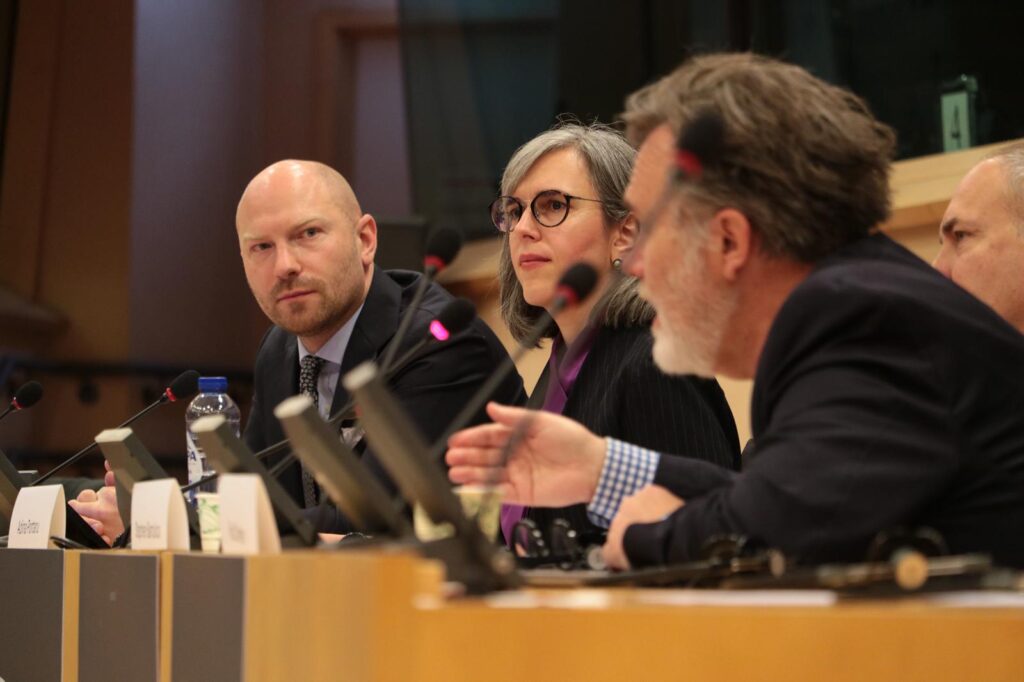
Brussels (21 May 2025) – Experts this morning warned about the threats of an EU online censorship law, in a first-of-its-kind, cross-party convening at the European Parliament.
The well-attended conference, which was co-hosted by ADF International, and Members of the European Parliament (MEPs) Stephen Bartulica and Virginie Joron, was entitled “The Digital Services Act and Threats to Freedom of Expression”.
The event followed the Bureau of Democracy, Human Rights, & Labour, a bureau within the US State Department, expressing concern about the censorial impact of the Digital Services Act (DSA).
At the event, which was attended by MEPs and staffers from across the political spectrum, think-tankers, journalists and others, Ms Joron warned that although the DSA was meant to create a “safe online environment”, it has “morphed into a tool that risks undermining our fundamental freedoms”.
She added: “What was sold as the Digital Services Act is increasingly functioning as a Digital Surveillance Act. The European Commission, alongside some parliamentarians, has seized upon the DSA as a political tool to control speech, particularly targeting platforms like X, Facebook, and Telegram.
“The DSA was meant to protect our digital space, not to control it… The DSA, once a shield for our rights, risks becoming a Trojan horse for surveillance and control.”
Mr Coleman, an international human rights lawyer specialising in free speech and Executive Director of ADF International, a Christian legal organisation that defends freedom of expression, told the conference: “Free speech is again under threat on this continent in a way it hasn’t been since the nightmare of Europe’s authoritarian regimes just a few decades ago.
“The internet is the frontline of this assault on free speech in Europe—particularly through the Digital Services Act.”
He added that “serious questions can and should be raised” about whether the DSA is compatible with “binding obligations to protect freedom of expression”.
He commented from his position of legal expertise that it was his “strong view” that “it is not”.
In his speech, Mr Bartulica warned that “hate speech”, which politicians want to use the DSA to “address”, is “impossible to define” as a legal concept.
He said quoting Christian Scripture could even be considered “hate speech” by those in power.
Mr Coleman mentioned the case of Finnish parliamentarian Päivi Räsänen, which is supported by ADF International, in his speech, as a “harrowing example of what censorship under the DSA could look like in practice”.
He said: “Six years ago, Päivi posted a picture of a Bible verse and expressed her Christian views on sexuality on X. She was criminally prosecuted for alleged ‘hate speech’ and has been unanimously acquitted in two trials.
“But the state prosecutor has appealed the case again. And shockingly, her case—in which she faces trial for posting online—is now pending before Finland’s Supreme Court.
“Now, under the DSA, deeply problematic national laws restricting speech—like the “hate speech” legislation used to prosecute Päivi —could be broadly applied across the EU by this simple principle: If it’s considered illegal in one place, it could be in every place.”
Mr Bartulica also said that in the EU “we have regulated or controlled speech and not free speech”.
He added: “We don’t have to reinvent the wheel—we’ve seen where mass censorship leads. Under communism and other totalitarian regimes, it’s not a pretty picture.
“There’s a totalitarian impulse in many of these people in Brussels, who are just waiting to censor speech they don’t like.”
JD Vance opposes Europe’s censorial ruling class
Also speaking at the event was American journalist and bestselling author Rod Dreher.
Mr Dreher, who is a friend of US Vice President JD Vance, said that following the Vice President’s speech in Munich, that people had asked him if VP Vance hates Europe.
He said: “Of course” the VP does not hate Europe—he loves it enough to speak the truth about its censorship crisis.
But Mr Dreher did say the VP opposes Europe’s censorial ruling class.
Mr Dreher observed that “elites would prefer to suppress discussion of discontent and its sources”—smearing such discussion as “hate speech”—rather than acknowledge the serious problems plaguing their societies.
Drawing on the wisdom of Soviet dissidents, he recommended that in the face of “soft totalitarianism” in the West today that people “refuse to participate in any event where one cannot speak the truth… Prepare to suffer for the truth”.
How to oppose the DSA
In his speech, Mr Coleman also gave concrete ways in which the DSA can be opposed.
He said: “It is thankfully the case that freedom of expression is guaranteed in Article 11 of the EU Charter, Article 10 of the European Convention on Human Rights and Article 19 of the International Covenant on Civil and Political Rights.
“According to these and the jurisprudence of the ECHR, any limitations to free speech must be proportionate and necessary in a democratic society.
“And so, serious questions can and should be raised about whether the DSA is compatible with these binding obligations to protect freedom of expression.
“It is my strong view, as you may have guessed from this speech, that it is not. So, what can be done about this?
“Member states could initiate an action for annulment before the Court of Justice of the European Union. Through this, the whole or parts of the DSA could be declared inapplicable, if they are deemed to infringe on the EU Charter or Treaties.
“The same question, of considering whether the DSA is compatible with binding obligations to protect free speech, is key for the upcoming DSA review, in which the Commission must evaluate the act in view of other legal commitments.
“It is imperative that every opportunity is taken in the review, which must occur by mid-November this year, to raise concerns about the censorial impact of the DSA.
“This could be accomplished through written or oral questions to the European Commission and even by inviting Commissioner Henna Virkkunen to discuss the legislation in the European Parliament. After all, if the Commissioner is as in favour of freedom of expression as she claims to be, why would she refuse?
“It is vital to include representatives of civil society, tech companies and digital rights groups in such conversations, as they can share their invaluable expertise on this important issue.
“As elected representatives of your people, you are also in an excellent position to bring the public’s attention to the grave risks to free speech posed by the DSA.
“The truth is that every single European’s rights are jeopardised by this legislation. The more the public is aware of and speaks out about this, the more pressure the Commission will feel. And the more likely we are to defeat this law.”
Background
Today’s conference was the first of its kind in the European Parliament to focus on the threats to free speech posed by the DSA, to offer concrete answers on how to oppose them, and to discuss the fundamental importance of freedom of expression for societal flourishing, in that context.
The gathering of free speech experts adds to steadily building pressure on the DSA, following a letter reportedly sent to the European Commission last week by the US House Judiciary Committee, expressing concern over the legislation.
Henna Virkkunen, the Commission’s Executive Vice-President for Tech Sovereignty, Security and Democracy, also met with Congressman Jim Jordan, Chair of the House Judiciary Committee, in Washington DC last week.
In a post on X, she said: “Candid exchange with @Jim_Jordan [Chairman Jordan].”
She went on to claim in the post: “Freedom of speech is a fundamental right in the EU and is strongly protected by our digital rules. Happy to continue our good discussion.”
Earlier this month, the US Department of State Bureau of Democracy, Human Rights, and Labor expressed concern over the censorial impact of the DSA.
The State Department bureau posted on X: “The Department of State is deeply concerned about efforts by governments to coerce American tech companies into targeting individuals for censorship. Freedom of expression must be protected – online and offline.
“Examples of this conduct are troublingly numerous. EU Commissioner Thierry Breton threatened X for hosting political speech.”
The post continued: “Türkiye fined Meta for refusing to restrict content about protests; and Australia required X to remove a post criticizing an individual for promoting gender ideology.
“Even when content may be objectionable, censorship undermines democracy, suppresses political opponents, and degrades public safety. The United States opposes efforts to undermine freedom of expression. As @SecRubio [Marco Rubio] said, our diplomacy will continue to place an emphasis on promoting fundamental freedoms.”
The Digital Services Act
EU politicians have stated their desire for the DSA to “address’ so-called “mis” and “disinformation” online—vague and subjective terms, which experts have warned can be used to justify censorship.
The regulation would provide an incentive to put pressure on tech companies, including American ones, to censor speech, rather than risk massive financial penalties for non-compliance.
There are additional concerns in the US about the DSA potentially having an extraterritorial impact and being used to censor speech inside America.
An attempt at using the regulation to censor speech in the US was seen last summer, when former Commissioner Thierry Breton warned Elon Musk to not breach the DSA ahead of his X interview with then-Presidential candidate Donald Trump.
Find more information on the DSA here.
Unpacking the EU Digital Services Act

Given the impact of digital services on the online and offline world, states, or, in this case, a supranational union with delegated powers, are increasingly seeking to regulate this domain. We live in an age where Big Tech holds unprecedented power—the annual revenue of these giants economically places them ahead of many states’ annual budgets. The DSA is the EU’s first comprehensive and binding regulation of digital service providers in more than twenty years.
What is the Digital Services Act?
Although it purports to create “a safe online environment,” the DSA is among the most dangerous censorship regimes of the digital age.
The DSA is a legally binding regulatory framework that gives the European Commission authority to enforce “content moderation” on very large online platforms and search engines (those with more than 45 million users per month) that are established, or offer their services, in the EU.
Most of its provisions came into force in February 2024. Platforms that fail to comply with the regulation face massive financial penalties and even suspension. Through the platform’s compliance with the DSA, individuals can suffer censorship, suspension from online platforms, and criminal prosecution (under national law).
The stated objective of the DSA is “ensuring a safe, predictable and trusted online environment, addressing the dissemination of illegal content online and the societal risks that the dissemination of disinformation or other content may generate, and within which fundamental rights enshrined in the Charter [of Fundamental Rights of the EU] are effectively protected, and innovation is facilitated”.
The Commission claims that the DSA creates “legal certainty,” “greater democratic control,” and “mitigation of systemic risks, such as manipulation or disinformation”—but, in reality, it is an authoritarian censorship regime antithetical to democracy.
Why is the DSA an extreme threat to fundamental freedoms?
The DSA requires platforms to censor “illegal content,” which it broadly defines as anything that is not in compliance with EU law or the law of any Member State (Article 3(h)). This could result in the lowest common denominator for censorship across the whole EU. Furthermore, authoritarian governments could adopt the blueprint, claiming that Western liberal states endorse it.
The DSA is deeply flawed. It is built on the idea that “bad speech” is best countered by censorship rather than robust discussion. Furthermore, the DSA gives the European Commission broad power over how platforms handle speech, which undermines the free expression essential to democratic societies.
If a censorship law such as the DSA is the “gold standard,” as the Commission has praised its own construct, authoritarian governments of the world will readily adopt the model.
Allowing “illegal content” to potentially be determined by one country’s vague and overreaching laws pits the DSA against international law standards that require any restrictions on speech to be precisely defined and necessary. This is extremely problematic given the increasing number of absurd so-called “hate speech” laws potentially criminalizing peaceful speech throughout Europe.
- Example 1: Germany’s highly controversial NetzDG Law, enacted in 2017, forces digital service providers to enforce sweeping online restrictions on certain kinds of content, linking to provisions of the criminal code and including the broad offence of “insult”. A person in Germany could see something “insulting” online that they claim is illegal under German law, file a complaint under the DSA, and trigger a take-down of the content for all countries in the EU, including countries where “insult” is not a criminal offense.
- Example 2: The DSA forces digital service providers to block specific people or messages, even those that come from outside the EU, from being heard by Europe. A Latin American president says something that a German believes violates German law. Under the DSA, that speech could be blocked (“content moderated”) from all EU countries.
How does the DSA censor speech?
The DSA is at the heart of Europe’s censorship industrial complex, consisting of a number of interwoven regulations and codes that give an unaccountable bureaucracy broad power to censor speech. Censorship occurs through vast “content moderation” networks coupled with a powerful enforcement mechanism to force platforms to comply.
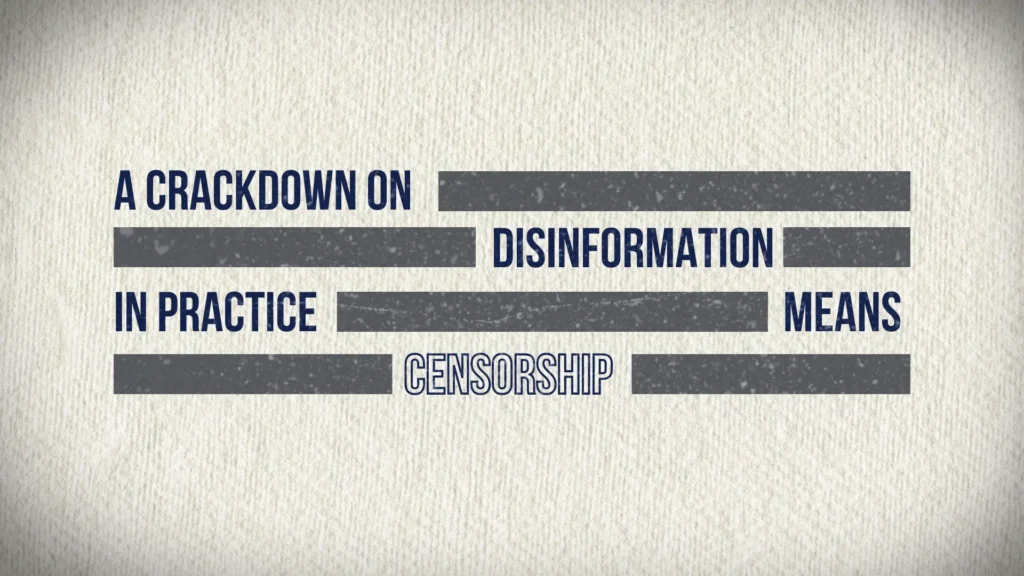
“Content Moderation”
The unelected and largely unaccountable Commission has positioned itself under the DSA to enable sweeping censorship in the name of “public safety” and “democracy”. It does this through a complicated mega-structure that allows the Commission to pull the strings of censorship, making private enterprises complicit and forcing them to comply with the threat of draconian fines.
The DSA creates a censorship industrial complex consisting of an expansive web of outsourced content flaggers, national coordinators, monitoring reporters, and other authorities, with the European Commission at its head. This is a business model dependent on finding content to censor and inconsistent with the standards of the rule of law.
The structure is intentionally unnavigable for the regular citizen to determine what is allowable speech. As platforms have the obligation to moderate content, the Commission can hide behind the DSA to claim that it itself is not censoring speech.
The DSA applies directly to all Member States without requiring national implementation. National regulators work with existing legal frameworks, and they create new structures to apply the DSA alongside domestic laws. In the event of a conflict, the DSA overrides national laws.
Content is policed by so-called “trusted flaggers,” including NGOs and private entities, and may even include law enforcement agencies like Europol. This deputizes organizations with their own agendas to enforce censorship at scale.
This system of “flaggers” reports content that they deem “illegal” to the platform. The platform must prioritize flagged content for removal. If the platform deems the content illegal, it must quickly remove it or disable access (by geo-blocking or hiding visibility).
Very large platforms also are obligated to proactively prevent “illegal content” by conducting regular risk assessments to identify how their services may spread “illegal content”. Under Article 34, these include “negative effects on civic discourse and electoral processes, and public security” and “effects in relation to gender-based violence, the protection of public health and minors and serious negative consequences to the person’s physical and mental well-being”. The efforts include: adapting their design, terms and conditions, algorithmic systems, advertising, content moderation, including for “hate speech,” and awareness-raising measures.
Enforcement
A powerful enforcement mechanism ensures compliance. Under the threat of enormous financial penalties and suspension, digital service providers are forced to censor and potentially suspend individuals, and individuals may even be criminally prosecuted.
Penalties for Individual Users:
- If, after content is flagged, the platform deems it illegal after its own review, it must remove it or disable access and notify the account.
- If individuals persistently post “illegal content,” platforms can suspend their accounts (after having issued a warning and with an obligation to be proportionate and for a reasonable period of time).
- Every Member State has a designated Digital Services Coordinator to enforce compliance with the DSA. The Coordinator can seek court orders to rule on the “illegal” nature of content on platforms and then fine and potentially suspend online platforms. If a user posts content that the platform suspects violates criminal laws in so far as it is “involving a threat to the life or safety of a person or persons” (Article 18(1)), the platform is required to notify the police, triggering potential domestic prosecution.
- This could happen under one of the many over-broad “hate speech” criminal laws in Europe. If the “hate speech” was subjectively determined to threaten the life or safety of a person or persons, it is possible that even peaceful speech without a real threat could be prosecuted (e.g., if, in the case of Päivi Räsänen, someone argued that her Twitter bible post endangered those who identify as LGBT).
Penalties for Platforms
- Platforms evaluate content under the threat of crippling fines with every incentive to censor and none to uphold free speech. They face little to no punishment for unjustly banning content and enormous penalties if they refuse to censor.
- If a platform refuses to remove or restrict access to “illegal content” after it has been flagged—especially by a “trusted flagger” or regulatory authority—the platform may face serious repercussions.
- The Digital Service Coordinators have broad powers to investigate platforms, issue orders, impose fines, and escalate cases to the European Commission. When dealing with very large platforms, the Commission can override the Coordinators at any time, giving it direct control over censorship enforcement. For these platforms, the Commission has the same powers as the Coordinators but lacks the requirement of “independence” to which the Coordinators are subject. (Article 50(2)).
- The Commission or national regulators can impose fines of up to 6% of the platform’s global annual turnover for non-compliance, amounting to billions. If non-compliance persists, platforms may face periodic penalty payments. Finally, it can restrict access to the platform within the EU or suspend operations.
Enhanced Enforcement
- The planned “European Democracy Shield” will strengthen the DSA and impose even stricter regulations on online speech. Its stated aim is to protect the EU from foreign information manipulation and interference, particularly in the digital realm, focusing on the integrity of elections and political processes. Together with the DSA, it can be weaponized to target peaceful expression, further empowering unelected bureaucrats to censor.
- The DSA grants emergency powers that allow the European Commission to demand additional censorship measures from online platforms during times of crisis, without sufficiently precise definitions or limitations.
- Crisis is defined as “where extraordinary circumstances lead to a serious threat to public security or public health in the Union or in significant parts of it” (Article 36(2)); “Such crises could result from armed conflicts or acts of terrorism, including emerging conflicts or acts of terrorism, natural disasters such as earthquakes and hurricanes, as well as from pandemics and other serious cross-border threats to public health” (para 91).
- The Commission may adopt a decision requiring very large platforms to take certain actions in response to the crisis: 1) assess how their services contribute to a serious threat, 2) apply measures to prevent, eliminate, or limit the threat, 3) report back to the Commission on those measures.
- The potential extraordinary measures it identifies are: “adapting content moderation processes and increasing the resources dedicated to content moderation, adapting terms and conditions, relevant algorithmic systems and advertising systems, further intensifying cooperation with trusted flaggers, taking awareness-raising measures and promoting trusted information and adapting the design of their online interfaces”. (para 91)
- In a worst-case scenario, the European Commission could crack down on speech at will whenever it decrees a crisis and force platforms to “mitigate risks”. This would prevents citizens from accessing information and sharing views, handing extraordinary power to bureaucrats to control narratives in times of upheaval.
- Crisis is defined as “where extraordinary circumstances lead to a serious threat to public security or public health in the Union or in significant parts of it” (Article 36(2)); “Such crises could result from armed conflicts or acts of terrorism, including emerging conflicts or acts of terrorism, natural disasters such as earthquakes and hurricanes, as well as from pandemics and other serious cross-border threats to public health” (para 91).
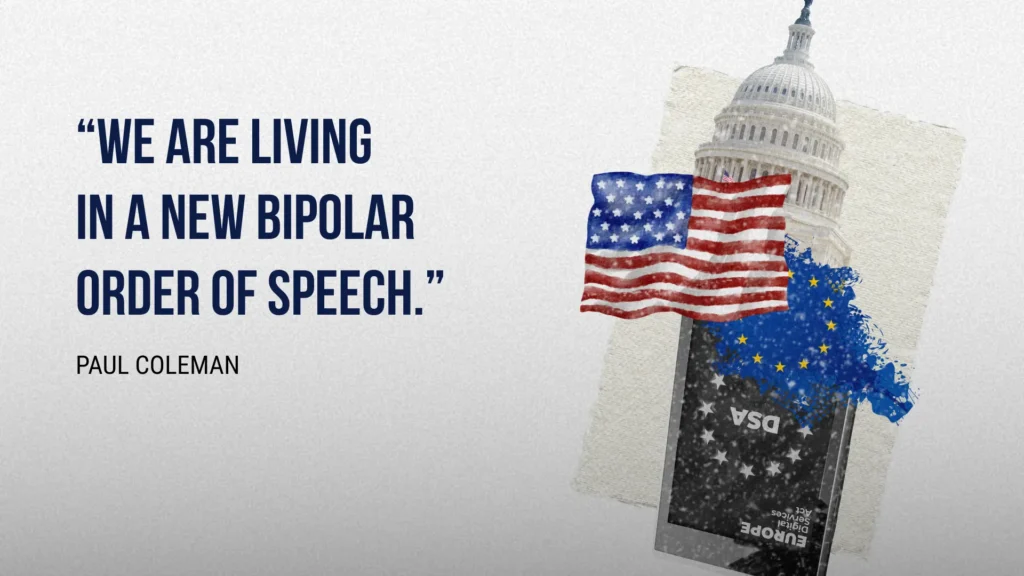
Is there recourse for a censored individual or platform forced to comply with the DSA?
The DSA severely limits the power of national courts to protect citizens’ free speech rights. National courts become the censorship long arm of the Commission. International appeal is possible but costly and onerous.
Appeal Options for Individuals
A censored individual can try to appeal directly to the platform, use a certified out-of-court dispute resolution mechanism, or appeal to the Digital Services Coordinator. While the out-of-court dispute settlement bodies offer a relatively easy appeal option (5 euros for the individual to submit), their decisions are not binding, and the platforms are only required to engage in good faith. If the platform does not, it leaves the individual user with only more expensive and lengthy judicial recourse. Faced with that reality, many are likely to just submit to censorship or preemptively self-censor.
Judicial Recourse
Individuals or the platform can technically challenge censorship in national courts, but the courts are required to comply with Commission decisions. Article 82 states: a “national court shall not take any decision which runs counter to that Commission decision. National courts shall also avoid taking decisions which could conflict with a decision contemplated by the Commission in proceedings”.
Individuals or platforms can take their cases to the Court of Justice of the European Union (CJEU), but this is a complex and costly process with strict requirements. The CJEU system takes 1-2 years for a ruling, sometimes longer, and rarely grants interim relief measures.
Is the DSA a problem only for Europe?
The DSA is a digital gag order with global consequences because it can censor you no matter where you live. Because the DSA applies to “Very Large Online Platforms” and search engines accessed within the EU but with a global presence, DSA censorship impacts the entire world.
Extraterritorial Applicability
The DSA explicitly states its extraterritorial applicability as it covers platforms used by people “that have their place of establishment or are located in the Union, irrespective of where the providers of those intermediary services [the platforms] have their place of establishment”. (Article 2(1))
While the DSA states in Article 9(2)(b) that takedown orders should be “limited to what is strictly necessary to achieve its objective,” there remain grave extraterritorial concerns.
De Facto Global Censorship Standards
Platforms may be inclined to adapt their international content moderation policies to EU censorship. If platforms deem something “illegal” under EU rules, that content may be banned everywhere, even in countries with strong free speech protections.
In its letter to European Commissioner Henna Virkkunen, the U.S. House Judiciary Committee wrote: “Though nominally applicable to only EU speech, the DSA, as written, may limit or restrict Americans’ constitutionally protected speech in the United States. Companies that censor an insufficient amount of ‘misleading or deceptive’ speech—as defined by EU bureaucrats—face fines up to six percent of global revenue, which would amount to billions of dollars for many American companies. Furthermore, because many social media platforms generally maintain one set of content moderation policies that they apply globally, restrictive censorship laws like the DSA may set de facto global censorship standards.”
Europe in the Dark
Individuals outside of Europe could find themselves censored within Europe. This could happen to even a head of state or individual with enormous international reach. In the worst case, blocking content from reaching the 500 million inhabitants of the European Union has the potential to cut an entire continent out of the conversation—a draconian move with world-changing impact.
What is ADF International doing to challenge the DSA?
The DSA is irreconcilable with the human right to free speech. It must be repealed or substantially reformed to protect open discourse and fundamental freedoms in the EU and across the world. We cannot allow the DSA to become the global model for digital speech control.
ADF International is committed to challenging violations of free speech resulting from the DSA and building critical momentum to repeal or substantially reform this censorial framework. We are working to amend or strike down the parts of the DSA that undermine freedom of expression.
There is no disagreement that certain expression is illegal (e.g. child exploitation, incitement to terrorism) and every social media platform has a legal obligation to restrict this content. The DSA goes far beyond this. Instead, the DSA has created a censorship mega structure to ban “illegal content” without defining what “illegal content” is. Over time, this mega structure could censor speech that any person in any EU country considers “illegal” according to whatever law is either in force now or may be passed in the future. Behind the 100+ pages of complex legislation hides a blank cheque for censorship.
What can be done to challenge the DSA at the European level?
- Equip Member States to initiate an action for annulment before the CJEU – Articles 277 and 263 of the Treaty on the Functioning of the EU (TFEU): Grounds to invoke include the lack of competence of the Commission, an infringement of the Treaties and the EU Charter (free speech), and a misuse of powers. This could result in having the DSA or parts of it declared “inapplicable”.
- Mobilize Member States in the Council to repeal the DSA through a political decision: Repealing legislation once adopted is very difficult, and the procedure is similar to that for adopting the legislation. The Commission could initiate the repeal, but that appears politically unlikely. Instead, Member States in the Council can build a critical mass and take action.
- Preliminary reference procedure before the CJEU – Article 267 TFEU: In the course of national litigation, any party or the judge, ex officio, can raise a question of EU law, particularly on its interpretation. Such questions could include the conformity of the DSA (e.g., the definition of illegal content under Article 3(h) and the obligation to act against illegal content under Article 9(2)(b)) with Article 11 of the EU Charter (freedom of expression and information). The decision to submit the reference to the CJEU rests entirely with the national judge, except for the situation when the case is at the court of the last instance, and the question of interpretation of EU law is necessary to decide the legal question at issue.
- Engage in the DSA review process: According to Article 91 of the DSA, by 17 November 2025, the Commission shall evaluate and report to the European Parliament, the Council, and the European Economic and Social Committee. The scope of this first review is limited, and it will be followed by another review in 2027 and then every five years.
International body to rule on case of Canadian man who spent time in prison for holding sign outside abortion facility almost 30 years ago
- Jim Demers was criminally convicted and spent almost two months in prison in 1996-97 for holding a sign quoting the American Convention on Human Rights: “Every person has the right to have his life respected”
- With no recourse left in Canada, Demers filed for redress with the Inter-American Commission on Human Rights in 2004 and has waited twenty years for justice.
- ADF International now representing Demers after 20-year wait: “As we grapple with the spread of censorship across the globe, this case presents an opportunity for a key human rights watchdog to reassert the very rights they were established to defend”

WASHINGTON, DC (21 November 2024) Jim Demers, a lifelong resident of British Columbia, Canada, was criminally convicted and spent almost two months in prison in 1996-97 for standing silently on a public sidewalk outside of an abortion facility. He held a sign quoting Article Four of the American Convention on Human Rights: “Every person has the right to have his life respected. This right shall be protected by law and, in general, from the moment of conception.”
Demers was standing in a censorship zone around the facility, which bans expression critical of abortion.
Demers was criminally convicted for his peaceful expression, for which he was given a suspended sentence of two years, subject to the condition of not returning to the public area surrounding the abortion facility.
After failing to obtain redress from the Canadian Supreme Court, Demers took his case to the Inter-American Commission on Human Rights in 2004. The Commission admitted his case in 2006, but almost 20 years later, has yet to rule. In the face of this egregious failure to deliver timely justice, ADF International assumed representation of Demers.
“I hope I’m never silent when bad things are happening, and I hope nobody else is silent either when bad things are happening. I have dedicated my life to speaking out in defense of the unborn, and because of this, I was criminally convicted and even spent time in jail,” said Demers.
“I have waited for almost 20 years for the Inter-American Commission on Human Rights to rule on my unjust conviction over the exercise of my freedom, and that of all people, to stand up, speak truth, and defend those that cannot defend themselves. I am grateful to ADF International for its efforts to bring this ordeal to an end. I will continue to advocate for the right to life of every person and look forward to the day when I can speak up without fear of criminal prosecution and punishment in Canada.”
“All human rights are in peril when the fundamental right to free speech is ignored,” stated Tomás Henríquez, lead lawyer on this case for ADF International. “For peacefully expressing his pro-life views on a sidewalk outside of an abortion facility, Jim Demers was convicted as a criminal and forced to spend time behind bars with serious felons. Even if you disagree with Jim’s beliefs, everyone should defend his right to voice them without fear of criminal prosecution and imprisonment. Now is the time for the Inter-American Commission to exercise its authority to deliver justice for Jim.”
“All human rights are in peril when the fundamental right to free speech is ignored.”
Demers stood outside of an abortion facility in Vancouver, British Columbia before Christmas of 1996, holding a sign quoting Article Four of the American Convention on Human Rights. The Access to Abortion Services Act of British Columbia, in force to this day, establishes so-called “bubble zones” around abortion facilities, creating a censorship zone that bans free expression. Notably, the law imposes viewpoint discrimination, as it only penalizes expressions that are critical of abortion, but not others.
Demers stood silently on the sidewalk outside of the main entrance, never engaging verbally or otherwise with any member of the public or of the abortion facility, or impeding entrance to the facility in any way.
For this peaceful expression, Demers was arrested, placed in jail pending trial for seven weeks, alongside violent criminals, and was ultimately convicted on criminal charges.
Demers filed a petition against Canada in 2004 with the Inter-American Commission on Human Rights. The Commission agreed to rule on the merits of his case in 2006 as to whether it was lawful to use criminal sanctions against Demers for his peaceful expression. Almost twenty years later, the Commission has yet to decide his case, in what is perhaps the most egregious case of alleged backlog at any international human rights body.
“ADF International is proud to stand with Jim as he seeks justice in his case at the Inter-American Commission on Human Rights. The Commission has slept on Jim’s case for almost 20 years. We call on the Commission to rule decisively that these actions by Canadian authorities violated Jim’s fundamental right to freedom of speech,” Henríquez continued.
“Both international law and the Canadian Charter of Rights and Freedoms guarantee the fundamental right to freedom of expression. As we grapple with the spread of censorship across the globe, this case presents an opportunity for our human rights watchdogs to reassert the very rights they were established to defend.”
Images for free use in print or online in relation to this story only.
Germany plans to unveil censorship zones which violate freedom of speech and free assembly
All of Germany must reject this bill because whether pro-life or not, censorship zones would ensnare everyone
-
 Paul Coleman
Paul Coleman

The German government is planning to introduce so-called censorship zones in certain locations – just like the UK. These censorship zones around abortion facilities are established to silence the pro-life view. These zones are not “pro-choice”, they’re no-choice.
And their actions deliberately ignore recent rulings by the Federal Administrative Court. Several weeks ago, the federal government approved a draft law on censorship zones to be established in certain locations in front of and around German abortion-related facilities in which certain opinions can no longer be expressed and certain peaceful activities prohibited.
What are censorship zones?
Censorship zones are areas defined by the local administration or even the legislature where specific opinions, actions or gatherings are prohibited. These zones censor certain expressions of opinion, hence the name ‘censorship zone’.
A look at Great Britain shows where restrictions on peaceful prayers can lead. In recent months, several people have been arrested there due to local censorship zones. The arrests occurred because individuals were quietly praying on a public street. The zones there have led to even silent prayer and, thus, thoughts being criminalized. We must not stand for this. Here’s why:
Censorship zones violate fundamental freedoms
Censorship zones are advanced under the guise of protecting women, but they are levied against peaceful individuals who in no way condone the harassment of women. After all, harassment is already prohibited under German criminal law.
What is most dangerous, however, is the fact that certain opinions are banned because they’re unpopular. Even if we disagree on abortion, we should agree that basic human rights—like free expression and free thought—are too important to throw out the window.
We all have the basic human right to think, act, and pray in accordance with our convictions.
Only recently, the Federal Administrative Court confirmed the right to freedom of assembly and freedom of opinion of a pro-life prayer group.
They gathered across the street from an abortion facility and quietly prayed. The police did not find harassment while observing the group in Pforzheim.
Similarly in the UK, A pro-life activist is being investigated for a third time for praying silently in a censorship zone.
She had nothing with her, did not prevent women from entering the abortion facility, and did not even speak to anyone. A silent prayer in her mind was enough to bring her to court – a serious violation of freedom of thought.
Censorship zones are clearly having serious consequences for fundamental freedoms in the UK and we cannot let the same thing happen in Germany.
These zones silence without offering help
Censorship zones do nothing to protect women. Rather, they block women from hearing about the offers of help available to them.
The sad reality is that these zones fail the women who choose abortion out of a sense of helplessness. By banning peaceful offers of help and alternative options, many women will feel even more alone.
Shouldn’t women in crisis pregnancies have access to help and alternative options to abortion?
If the state can ban freedom of expression and assembly in front of certain establishments, why not in other places?
There is no logical endpoint for such censorship
Freedom of expression, assembly, and freedom of religion benefit all people. These fundamental rights cannot be restricted under the pretext of harassment – which is already a criminal offence.
This bill is aimed at silencing pro-life views, to get those who stand up for the lives of the unborn to self-censor and remain silent. That’s why we’re pushing back against these censorial laws – will you help us?
The bill, which was approved by the cabinet on January 24th, 2024, will now be forwarded to the Bundesrat, which can already introduce amendments. This will be followed by the legislative process in the Bundestag, which will end with a vote on the law.
As the legal impact of these zones becomes clear, we must remain committed to defending the basic human right to free expression, including preventing the proliferation of “thought crimes” where people can even be prosecuted for silent prayer.
Will you stand alongside us for the protection of freedom of expression and freedom of assembly?
We must stand up for our fundamental rights together.
STATEMENT: ADF International stands for freedom of expression alongside US Congress members, international experts, expressing concern over WHO “pandemic treaty”
ADF International today joined press conference led by Congressman Chris Smith (R-NJ) to express concern over proposed WHO Pandemic Agreement.
Continue reading



